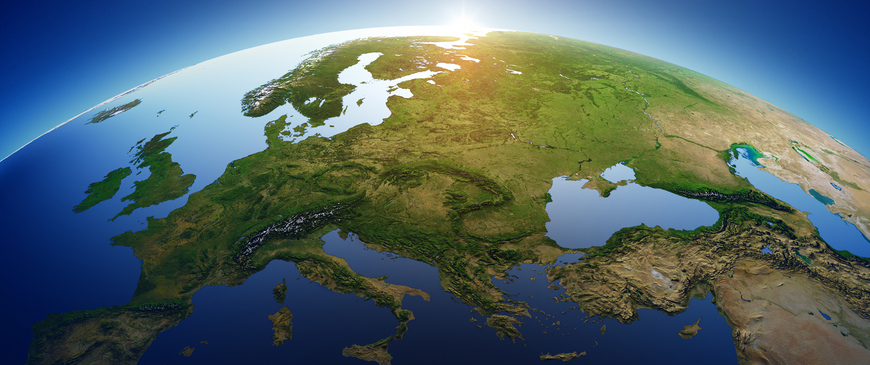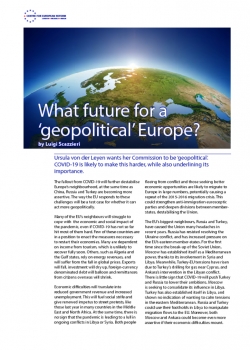
What future for a 'geopolitical' Europe?
Ursula von der Leyen wants her Commission to be ‘geopolitical’. COVID-19 is likely to make this harder, while also underlining its importance.
The fallout from COVID-19 will further destabilise Europe’s neighbourhood, at the same time as China, Russia and Turkey are becoming more assertive. The way the EU responds to these challenges will be a test case for whether it can act more geopolitically.
Many of the EU’s neighbours will struggle to cope with the economic and social impact of the pandemic, even if COVID-19 has not so far hit most of them hard. Few of these countries are in a position to enact the measures necessary to restart their economies. Many are dependent on income from tourism, which is unlikely to recover fully soon. Others, such as Algeria and the Gulf states, rely on energy revenues, and will suffer from the fall in global prices. Exports will fall, investment will dry up, foreign-currency denominated debt will balloon and remittances from citizens overseas will shrink.
Many of the EU’s neighbours will struggle to cope with the economic and social impact of the pandemic, even if COVID-19 has not so far hit most of them hard.
Economic difficulties will translate into reduced government revenue and increased unemployment. This will fuel social strife and give renewed impetus to street protests, like those last year in many countries in the Middle East and North Africa. At the same time, there is no sign that the pandemic is leading to a lull in ongoing conflicts in Libya or Syria. Both people fleeing from conflict and those seeking better economic opportunities are likely to migrate to Europe in large numbers, potentially causing a repeat of the 2015-2016 migration crisis. This could strengthen anti-immigration eurosceptic parties and deepen divisions between member-states, destabilising the Union.
The EU’s biggest neighbours, Russia and Turkey, have caused the Union many headaches in recent years. Russia has resisted resolving the Ukraine conflict, and has increased pressure on the EU’s eastern member-states. For the first time since the break-up of the Soviet Union, Moscow has established itself as a Mediterranean power, thanks to its involvement in Syria and Libya. Meanwhile, Turkey-EU tensions have risen due to Turkey’s drilling for gas near Cyprus, and Ankara’s intervention in the Libyan conflict. There is little sign that COVID-19 will push Turkey and Russia to lower their ambitions. Moscow is seeking to consolidate its influence in Libya. Turkey has also established itself in Libya, and shown no indication of wanting to calm tensions in the eastern Mediterranean. Russia and Turkey could use their footholds in Libya to manipulate migration flows to the EU. Moreover, both Moscow and Ankara could become even more assertive if their economic difficulties mount.
At the same time, the pandemic has been accompanied by a more aggressive Chinese foreign policy. Beijing mismanaged its initial response to COVID-19, and has sought to deflect blame. It has threatened countries that have criticised it, and tried to influence public opinion by spreading disinformation and providing high-profile assistance to EU member-states like Italy. China has also taken advantage of the confusion created by the pandemic to tighten its grip on Hong Kong. These moves have sharpened tensions between the US and China: President Donald Trump has blamed Beijing for the pandemic, and stated that he wants to decouple the US economy from China. The US has pressured Europe to support its harder stance, pushing Europeans to exclude the Chinese firm Huawei from their 5G networks.
Whether Trump wins a second term or not, the US will continue to push the EU to take a firmer stance towards Beijing. Democrats agree with Trump that the US needs to be tougher, even if their rhetoric is softer. The EU shares many of the US’s concerns. Even before the pandemic the Commission had defined China as a ‘systemic rival’. Europeans increasingly agree with the US that they must be more assertive in defending their interests. The Commission wants to make it harder for Chinese firms that receive state subsidies to invest in Europe or bid for contracts. But member-states are unwilling to be as tough on China as the US is: their initial reaction to Beijing’s move to curtail Hong Kong’s autonomy was relatively muted, with little discussion of measures to deter China from further action. And most member-states remain unwilling to exclude Huawei from their 5G networks, fearing that China may restrict access to its market in retaliation. European opinions of China may have hardened, but the EU seems keen to stake out its own approach rather than following the US. This is likely to lead to increased transatlantic friction.
Whether Trump wins a second term or not, the US will continue to push the EU to take a firmer stance towards Beijing.
Europe will need to prevent its neighbourhood from becoming even more unstable, helping the region to deal with the health emergency and weather COVID-19’s economic blow. But funding for EU external action and defence programmes in the 2021-2027 EU budget has been sharply reduced compared to the Commission’s original proposals – by €15 billion in the case of external action funds. If the EU wants to prevent its neighbours from becoming destabilised, it will also need to take more responsibility for regional security. Europeans can no longer rely on the US: even if Joe Biden is elected the US is likely to prioritise China over the Middle East. In order to be less vulnerable to migration blackmail attempts, member-states need to build a humane and functional migration policy. Finally, Europe will need to defend its economic interests against China, rebalancing its relationship with Beijing and working with the US, without being dragged into a new Cold War.
The risk is that Europeans may be too weak economically and divided politically to tackle these challenges effectively. Member-states have become tougher on China, but economic difficulties may deter them from being more robust, for fear of compromising their economic recovery. Member-states may also be unwilling to provide the EU’s neighbours with the assistance they need to fight the pandemic and mitigate its economic consequences. They may decide to cut defence budgets, undermining their ability to deter aggression. Finally, Europeans may be unable to agree on how to stabilise their neighbourhood. There is little sign of them converging on a common Libya policy, with France, Greece and Cyprus supporting the rebel General Khalifa Haftar in order to curtail Turkey’s influence, while Italy favours the UN-backed Government of National Accord.
Internal political divisions will also continue to weaken the EU. The recovery fund is an important step forward, but it may not be enough to generate a strong economic recovery in the countries hardest hit by the coronavirus recession, such as Italy and Spain. Disillusionment with the EU is likely to continue to fester in many member-states, and the rise to power of a eurosceptic populist government in a large member-state like Italy or France will continue to be a real risk that could sabotage efforts to make the Union more assertive on the global stage.
COVID-19 makes a more geopolitical Commission more necessary than ever. At the same time, there is a risk that the economic crisis and internal divisions will make member-states more inward-looking. But if they neglect the international challenges Europe faces, they will only store up bigger problems for the future.
Luigi Scazzieri is a research fellow at the Centre for European Reform.

